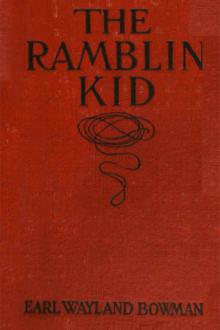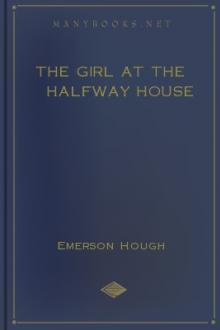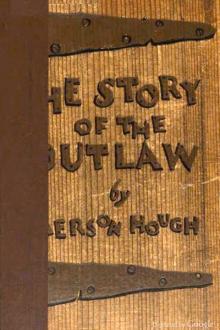The Cross-Cut, Courtney Ryley Cooper [best ereader for manga txt] 📗

- Author: Courtney Ryley Cooper
Book online «The Cross-Cut, Courtney Ryley Cooper [best ereader for manga txt] 📗». Author Courtney Ryley Cooper
As carefully as possible, he wrapped Harry in the blankets, seeking to protect him in every way against the cold. With a great effort, he lifted him, the sick man's frame huddled in his arms like some gigantic baby, and started out of the eerie, darkened house.
The stairs—the landing—the hall! Then a query from below:
"Is that you, Roady?"
The breath pulled sharp into Fairchild's lungs. He answered in the best imitation he could give of the voice of Squint Rodaine:
"Yes. Go on with your digging, Honey. I 'll be there soon."
"And you'll kiss me?"
"Yes. Just like I kissed you the night our boy was born."
It was sufficient. The chanting began again, accompanied by the swish of the spade as it sank into the earth and the cludding roll of the clods as they were thrown to one side. Fairchild gained the door. A moment more and he staggered with his burden into the protecting darkness of the night.
The snow crept about his ankles, seeming to freeze them at every touch, but Fairchild did not desist. His original purpose must be carried out if Rodaine were not to know,—the appearance that Harry had aroused himself sufficiently to wrap the blankets about him and wander off by himself. And this could be accomplished only by the pain and cold and torture of a barefoot trip.
Some way, by shifting the big frame of his unconscious partner now and then, Fairchild made the trip to the main road and veered toward the pumphouse of the Diamond J. mine, running as it often did without attendance while the engineer made a trip with the electric motor into the hill. Cautiously he peered through the windows. No one was there. Beyond lay warmth and comfort—and a telephone. Fairchild went within and placed Harry on the floor. Then he reached for the 'phone and called the hospital.
"Hello!" he announced in a husky, disguised voice. "This is Jeb Gresham of Georgeville. I 've just found a man lying by the side of the Diamond J. pumphouse, unconscious, with a big cut in his head. I 've brought him inside. You 'll find him there; I 've got to go on. Looks like he 's liable to die unless you can send the ambulance for him."
"We 'll make it a rush trip," came the answer, and Fairchild hung up the 'phone, to rub his half-frozen, aching feet a moment, then to reclothe them in the socks and shoes, watching the entrance of the Diamond J. tunnel as he did so. A long minute—then he left the pumphouse, made a few tracks in the snow around the entrance, and walked swiftly down the road. Fifteen minutes later, from a hiding place at the side of the Clear Creek bridge, he saw the lights of the ambulance as it swerved to the pumphouse. Out came the stretcher. The attendants went in search of the injured man. When they came forth again, they bore the form of Harry Harkins, and the heart of Fairchild began to beat once more with something resembling regularity. His partner—at least such was his hope and his prayer—was on the way to aid and to recovery, while Squint Rodaine would know nothing other than that he had wandered away! Grateful, lighter in heart than he had been for days. Fairchild plodded along the road in the tracks of the ambulance, as it headed back for town.
The news already had spread by the time he reached there; news travels fast in a small mining camp. Fairchild went to the hospital, and to the side of the cot where Harry had been taken, to find the doctor there before him, already bandaging the wound on Harry's head and looking with concern now and then at the pupils of the unconscious man's eyes.
"Are you going to stay here with him?" the physician asked, after he had finished the dressing of the laceration.
"Yes," Fairchild said, in spite of aching fatigue and heavy eyes. The doctor nodded.
"Good. I don't know whether he 's going to pull through or not. Of course, I can't say—but it looks to me from his breathing and his heart action that he 's not suffering as much from this wound as he is from some sort of poisoning.
"We 've given him apomorphine and it should begin to take effect soon. We 're using the batteries too. You say that you 're going to be here? That's a help. They 're shy a nurse on this floor to-night, and I 'm having a pretty busy time of it. I 'm very much afraid that poor old Judge Richmond 's going to lay down his cross before morning."
"He 's dying?" Fairchild said it with a clutching sensation at his throat. The physician nodded.
"There 's hardly a chance for him."
"You 're going there?"
"Yes."
"Will you please give—?"
The physician waited. Finally Fairchild shook his head.
"Never mind," he finished. "I thought I would ask you something—but it would be too much of a favor. Thank you just the same. Is there anything I can do here?"
"Nothing except to keep watch on his general condition. If he seems to be getting worse, call the interne. I 've left instructions with him."
"Very good."
The physician went on, and Fairchild took his place beside the bed of the unconscious Harry, his mind divided between concern for his faithful partner and the girl who, some time in the night, must say good-by forever to the father she loved. It had been on Fairchild's tongue to send her some sort of message by the physician, some word that would show her he was thinking of her and hoping for her. But he had reconsidered. Among those in the house of death might be Maurice Rodaine, and Fairchild did not care again to be the cause of such a scene as had happened on the night of the Old Times dance.
Judge Richmond was dying. What would that mean? What effect would it have upon the engagement of Anita and the man Fairchild hoped that she detested? What—then he turned at the entrance of the interne with the batteries.
"If you 're going to be here all night," said the white-coated individual, "it 'll help me out a lot if you 'll use these batteries for me. Put them on at their full force and apply them to his cheeks, his hands, his wrists and the soles of his feet alternately. From the way he acts, there 's some sort of morphinic poisoning. We can't tell what it is—except that it acts like a narcotic. And about the only way we can pull him out is with these applications."
The interne turned over the batteries and went on about his work, while Fairchild, hoping within his heart that he had not placed an impediment in the way of Harry's recovery by not telling what he knew of Crazy Laura and her concoctions, began his task. Yet he was relieved by the knowledge that such information could aid but little. Nothing but a chemical analysis could show the contents of the strange brews which the insane woman made from her graveyard herbiage, and long before that could come, Harry might be dead. And so he pressed the batteries against the unconscious man's cheeks, holding them there tightly, that the full shock of the electricity might permeate the skin and arouse the sluggish blood once more to action. Then to the hands, the wrists, the feet and back again; it was the beginning of a routine that was to last for hours.
Midnight came and early morning. With dawn, the figure on the bed stirred slightly and groaned. Fairchild looked up, to see the doctor just entering.
"I think he 's regaining consciousness."
"Good." The physician brought forth his hypodermic. "That means a bit of rest for me. A little shot in the arm, and he ought to be out of danger in a few hours."
Fairchild watched him as he boiled the needle over the little gas jet at the head of the cot, then dissolved a white pellet preparatory to sending a resuscitory fluid into Harry's arm.
"You 've been to Judge Richmond's?" he asked at last.
"Yes." Then the doctor stepped close to the bed. "I 've just closed his eyes—forever."
Ten minutes later, after another examination of Harry's pupils, he was gone, a weary, tired figure, stumbling home to his rest—rest that might be disturbed at any moment—the reward of the physician. As for Fairchild, he sat a long time in thought, striving to find some way to send consolation to the girl who was grieving now, struggling to figure a means of telling her that he cared, that he was sorry, and that his heart hurt too. But there was none.
Again a moan from the man on the bed, and at last a slight resistance to the sting of the batteries. An hour passed, two; gradually Harry came to himself, to stare about him in a wondering, vacant manner and then to fasten his eyes upon Fairchild. He seemed to be struggling for speech, for co�rdination of ideas. Finally, after many minutes—
"That's you, Boy?"
"Yes, Harry."
"But where are we?"
Fairchild laughed softly.
"We 're in a hospital, and you 're knocked out. Don't you know where you 've been?"
"I don't know anything, since I slid down the wall."
"Since you what?"
But Harry had lapsed back into semi-consciousness again, to lie for hours a mumbling, dazed thing, incapable of thought or action. And it was not until late in the night after the rescue, following a few hours of rest forced upon him by the interne, that Fairchild once more could converse with his stricken partner.
"It's something I 'll 'ave to show you to explain," said Harry. "I can't tell you about it. You know where that little fissure is in the 'anging wall, away back in the stope?"
"Yes."
"Well, that's it. That's where I got out."
"But what happened before that?"
"What didn't 'appen?" asked Harry, with a painful grin. "Everything in the world 'appened. I—but what did the assay show?"
Fairchild reached forth and laid a hand on the brawny one of his partner.
"We 're rich, Harry," he said, "richer than I ever dreamed we could be. The ore's as good as that of the Silver Queen!"
"The bloody 'ell it is!" Then Harry dropped back on his pillow for a long time and simply grinned at the ceiling. Somewhat anxious. Fairchild leaned forward, but his partner's eyes were open and smiling. "I 'm just letting it sink in!" he announced, and Fairchild was silent, saving his questions until "it" had sunk. Then:
"You were saying something about that fissure?"
"But there is other things first. After you went to the assayers, I fooled around there in the chamber, and I thought I 'd just take a flyer and blow up them 'oles that I 'd drilled in the 'anging wall at the same time that I shot the other. So I put in the powder and fuses, tamped 'em down and then I thinks thinks I, that there's somebody moving around in the drift. But I did n't pay any attention to it—you know. I was busy and all that, and you often 'ear noises that sound funny. So I set 'em off—that is, I lit the fuses and I started to run. Well, I 'ad n't any more 'n started when bloeyy-y-y-y, right in front of me, the whole world turned upside down, and I felt myself knocked back into the chamber. And there was them fuses. All of 'em burning. Well, I managed to pull out the one from the foot wall and stamp it out, but I didn't 'ave time to get at the others. And the only place where there was a chance for me was clear at the end of the chamber. Already I was bleeding like a stuck hog where a whole 'arf the mountain 'ad 'it me on the 'ead, and I did n't know much what I was doing. I just wanted to get be'ind something—that's all I could think of. So I shied for that fissure in the rocks and crawled back in there, trying to squeeze as far along as I could. And 'ere 's the funny part of it—I





Comments (0)